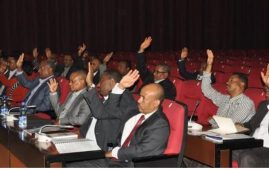No less than three of ten, on average, EPRDFites holding posts at City, Sub-city and Woreda Administrative tiers of Addis Ababa earned their dismissal in the Gimgema held in the past weeks. The trend appears similar across the nation. Though this has yet to be corroborated by an official statement, there are sufficient reasons to expect the party is about to embark on such an overhaul.
EPRDF chair Meles Zenawi indicated, several months ago, responding to a question concerning the recall of Ethiopia’s Ambassador to USA, there is going to be a comprehensive overhaul of all officials if his party wins. The party had also hinted, on several occasions, its plan to launch a thorough Gimgema – the party’s version of institutional and members performance appraisal.
Understandably, many second-guessed the party’s commitment to root out its weaklings. In fact, the party had never been bereft of Gimgema rather the will to take on the opportunistic and the wicked in its echelon. That contributed to cynicism towards Gimgema of whatever scope and intensity.
So, what could be different this time around?
It appears EPRDF launched a far-reaching Gimgema in its recent history. EPRDF conducted an all-encompassing Gimgema in the last few weeks – still in motion or to commence soon in some levels & areas. The current Gimgema focuses, among other things, on three issues identified by the Executive Committee, based on an overall organizational appraisal, as ‘key current problems of the system.’
The focal issues are ‘rent-seeking tendencies’, Alemetegagele (‘አለመተጋገል’), and ‘undemocratic nationalism’.
‘Rent-seeking tendency’ covers various forms of nepotism and patronage. It targets not only flagrant cases of bribery, but also members associated with informal networks for bribery and similar questionable proposes. Alemetegagele means, according to the party’s dictionary, turning a blind eye to a fellow member’s misdeeds. This is premised on the party principle that a member is duty bound to correct and expose fellow members, using party forums, regardless of rank and seniority. Failure to do so, or being selective, amounts to disciplinary fault.
The third ‘key issue’ of the Gimgema point, applied uniformly across all EPRDF sister and associate parties, is ‘undemocratic nationalism’ which is includes all forms of acts and tendencies of capitalizing on ethnic allegiance. There is more to this issue than unearthing members who are aspirants of the old version of Ethiopianism or sympathizers of secessionist groups’, which is deemed a less pressing problem. Instead, EPRDF claim nepotism is the underlying motive and/or outcome of all forms undemocratic nationalism and, at any rate, runs counter to democratic developmentalist character of the party. Recent publications of the party blamed ‘undemocratic nationalism’ for undermining the unified stance of Revolutionary Democrats ‘in the struggle against rent-seeking tendencies’.
No less than 3 out of ten, on average, EPRDFites holding posts at City, Sub-city, and Woreda Administrative tiers of Addis Ababa earned their dismissal in the Gimgema held in the past weeks, according to unofficial sources. As they were allegedly found at fault in one or more of the aforestated ‘key problems’, in addition to in a couple more of the numerous disciplinary issues that are legible to be raised at Gimgema forums; such as failure to attend meetings, shunning away party duties, gross non-observance of social norms, etc. The trend seems to be the same across the nation.
Based on experiences, the Mayor will soon effect the decisions of the Gimgema by issuing letters of dismissal and assigning others on acting status rather than letting the out-going stay in office. The numbers may vary, probably increase, depending on what incriminating or exonerating things will turn up concerning officials, who are currently at a different locality or post, when Gimgema reports from other quarters, sister & associate parties, reach the center .
What’s more important is whether the party leadership will seize on the opportunity to display its intolerance towards deviants or dismay millions by turning it into another round of revamp. It is not uncommon to see one assigned at a different post of equivalent status and benefits, soon after being expelled for poor performance or misuse of power. Such decisions may be defended on the need to correct outcomes of Gimgema forums that went astray and the party’s established practice of rehabilitating errant and offering second-chances. Yet, since it is rarely done in a transparent and systemic manner, it disillusions those who voted against that official and erodes public confidence on the party.
There are sufficient reasons to be optimistic. The Metekakat plan, which sets age 60 as age of retirement from senior posts; the trio legal instruments that provide for the registration of officials’ property, citizens access to information, and benefits of officials that leave office gracefully; and the soon-to-come measures to change of the civil servants age composition. The five things, cumulatively, suggest the ruling party’s intention to undertake not only a full-scale overhaul, but also to obliterate all strongholds of nepotism and patronage and sources of inertia.
The Metekakat plan, a three phased replacement of ‘all senior EPRDF officials serving at senior posts for long time’, including its chair until 2015, appears to be a copycat of Deng Xiaoping’s move that brought a full-scale transfer of the Politburo of the Chinese Communist Party to the ‘second generation’, in the second-half of the 1980s. Xiaoping’s resignation triggered a massive resignation of senior officials and the phenomenon deemed as the first generational change. More importantly, it developed into a norm that ensured the vibrancy of the party leadership, currently held by the ‘fifth generation’.
In the same fashion, Meles Zenawi’s insistence on resignation (reinforced by similar moves of a few others – Tefera Walwa, Sebhat Nega) enabled the endorsement of the Metekakat plan by EPRDF Council last summer. It made the idea of leaving office palatable, if not unavoidable, to those senior members who could have hold grudges otherwise, in a country where holding public posts, or any other post for that matter, is idolized with an attitude reminiscent of its feudal days.
This, in turn, is expected to entice other senior members to welcome the generational change, thus resign gracefully from government and party posts, and give up their aspirations for higher posts. For one, the resignations of their highly esteemed leader, and senior officials of all parties, make it difficult to resist the change for others. As virtually none of the mid-level and low-ranking officials would dare to claim having more worthiness or popularity than their leaders.
On the other hand, properly carried out, the Metekakat plan, which sets age 65 as retirement age, is expected to result in attitude change, among both party members and the public. A person not holding government posts will not necessarily be seen as ‘rejected’. Political appointments may no longer be seen as a measure of the value of members and supporters. It also provides an opportunity to establish a norm of making assignments based on a person’s relevance and ability to advance the party’s objectives and public ratings at the concerned post.
The trio legal instruments that which are to take full effect in the coming Ethiopian year are equally important and instrumental to the success of the Metekakat plan. The law for registration of the property of public officials and its twin that provides for benefits of officials who leave office gracefully are the carrot-and-stick that convinces not a few it is time to leave. Those who doubt the seriousness of the danger will not fail to note the recent crackdowns on various mid-level federal officials by Anti-Corruption and Ethic Authority.
Though the benefits of former officials the new law provides are neither lucrative nor comprehensive, it is very likely that the party will look after those departing officials with allowances of Board membership in public enterprises and by employing them at the various enterprises under the regional endowments, where employment decisions are not constrained by Civil Service laws. The party can influence the management of the endowments and ancillary enterprises, with its members who seat at the boards of those enterprises on behalf of the endower – that is, one of the four parties that make up EPRDF.
The law providing for unprecedented level of access for information, though its true colors has yet to be seen with the by-laws for its implementation. Yet, properly carried out, it has the potential to cement the changes that may be brought with the leadership change and official’s property registration. (I intend to discuss in detail these three laws another time)
And, the civil service. There is a plan to change the age composition of the civil service, as the premier indicated in a press conference held in the first half of the last Ethiopian year. He said the government intends to make room for new graduates through a scheme that facilitates early retirement of senior civil servants. There is no indication that the government abandoned the plan and the delay can be attributed to the non-completion BPR(Business Process Reengineering).
Whether and how far politically charged it is has yet to been seen. However, one can rest assured that it is partly motivated by the intent to create a more change receptive bureaucracy favorable for policy implementation. It also provides an opportunity to mold the public service in a manner that makes it more accountable and responsive.
THE DETERMINATE FACTOR
Ultimately, the determinate factor would be the commitment of the leadership. The election left the party with fewer excuses. The political environs do not justify accommodating its weaklings on the pretext of their ‘unmatched’ or ‘irreplaceable’ loyalty to the party’s cause. On the contrary, its huge electoral mandate obliges it to take every public grievance seriously and strive for perfection.
Not only the moral duty to live unto the peoples’ expectations, but also for pragmatic reasons. Bereft of significant strides in good governance, it would be untenable to defend its dominant party status and the tools thereto. The success of the economic objective Masfafat (‘scaling up’ the economic & institutional improvements) would be doubtful.
Perhaps, the upcoming party congress may signal the way forward.
Technorati Tags: EPRDF, Meles Zenawi, Ethiopia Gimgema , metekakat, leadership change, Addis Ababa







